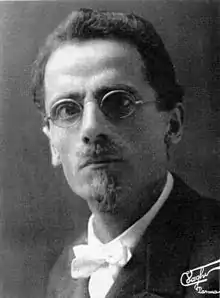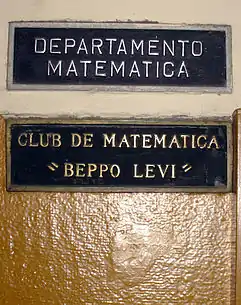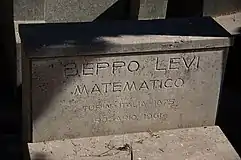Beppo Levi
Beppo Levi (14 May 1875 – 28 August 1961) was an Italian mathematician. He published high-level academic articles and books, not only on mathematics, but also on physics, history, philosophy, and pedagogy. Levi was a member of the Bologna Academy of Sciences and of the Accademia dei Lincei.
Beppo Levi | |
|---|---|
 | |
| Born | May 14, 1875 Turin, Italy |
| Died | August 28, 1961 (aged 86) Rosario, Argentina |


Early years
Beppo Levi was born on May 14, 1875, in Turin, Italy, and he was an older brother of Eugenio Elia Levi. He obtained his Ph.D. in mathematics at age 21 from the University of Turin, where he was appointed Assistant Professor three months later and shortly thereafter became a full-time Scholar. Levi was appointed Professor at the University of Piacenza in 1901, at the University of Cagliari in 1906, at the University of Parma in 1910, and finally at the University of Bologna in 1928. The years that followed his last appointment saw the rise of Benito Mussolini's power and of antisemitism in Italy, and Levi, being Jewish, was soon expelled from his position at the University of Bologna. He emigrated to Argentina, as did many other European Jews at that time.
Life in Argentina
Levi chose Argentina because of an invitation by the engineer Cortés Plá, dean of the Facultad de Ciencias Matemáticas, Físico-Químicas y Naturales Aplicadas a la Industria at the Universidad Nacional del Litoral (currently Facultad de Ciencias Exactas, Ingeniería y Agrimensura at the Universidad Nacional de Rosario) in the city of Rosario. Cortés Plá invited Levi to come to Rosario to head the recently created Instituto de Matemática. It was there that Levi did most of his work from 1939 until his death in 1961.
While living in Rosario, Levi joined a group of mathematicians that included Luis Santaló, Simón Rubinstein, Juan Olguín, Enrique Ferrari, Fernando and Enrique Gaspar, Mario Castagnino and Edmundo Rofman. In 1940 Levi founded Mathematicae Notae, the first mathematical journal in Argentina. In 1956 he was awarded the Italian Premio Feltrinelli.
He died on August 28, 1961 in Rosario, Argentina, and was buried in the Jewish cemetery there.
Mathematical contributions
His early work studied singularities on algebraic curves and surfaces. In particular, he supplied a proof (questioned by some) that a procedure for resolution of singularities on algebraic surfaces terminates in finitely many steps. Later he proved some foundational results concerning Lebesgue integration, including a statement that even today appears in many measure theory textbooks as "Beppo Levi's lemma".
He also studied the arithmetic of elliptic curves. He classified them up to isomorphism, not only over C, but also over Q. Next he studied what in modern terminology would be the subgroup of rational torsion points on an elliptic curve over Q: he proved that certain groups were realizable and that others were not. He essentially formulated a conjecture as to what the complete list of possibilities should be, a conjecture that was to be made independently by Andrew Ogg about 60 years later, and finally proved by Barry Mazur.
References
Biographic and general references
- Coen, Salvatore (1999), "Beppo Levi: una biografia", in Levi, Beppo (ed.), Opere (Collected Works). Volume I: 1897-1906 (in Italian), Bologna: Edizioni Cremonese (distributed by Unione Matematica Italiana), Zbl 1054.01520. An ample biographical paper of nearly 40 pages, an earlier version of which was published as Coen, Salvatore (1994), "Beppo Levi: la vita", in Coen, Salvatore (ed.), Seminari di geometria, Università di Bologna, Italia, 1991–1993 (in Italian), Bologna: Università degli Studi di Bologna, Dipartimento di Matematica, pp. 193–232, MR 1265762, Zbl 0795.01022.
- Viola, Tullio (1961), "Necrologio di Beppo Levi", Bollettino della Unione Matematica Italiana, Serie 3, 16 (4): 513–516
References describing his scientific contributions
- Levi, Beppo (1999), Opere di Beppo Levi 1897–1926 [Works of Beppo Levi 1897–1926], 1: 1897–1906, Bologna: Edizioni Cremonese (distributed by Unione Matematica Italiana), Zbl 1054.01520
- —— (1999), Opere di Beppo Levi 1897–1926 [Works of Beppo Levi 1897–1926], 2: 1907–1926, Bologna: Edizioni Cremonese (distributed by Unione Matematica Italiana), Zbl 1054.01521.
- Schappacher, N.; Schoof, R. (1996), "Beppo Levi and the arithmetic of elliptic curves", The Mathematical Intelligencer, 18 (1): 57–69, doi:10.1007/bf03024818, MR 1381581, Zbl 0849.01036. For a freely downloadable offprint from the web site of one of the two authors, see here.
External links
- Beppo Levi at the Mathematics Genealogy Project.
- Coen, Salvatore; Lanconelli, Ermanno, eds. (June 12–13, 2008), Convegno Italo – Argentino in onore di Beppo Levi (Italian – Argentinian meeting in honour of Beppo Levi), Bologna. The web site of a scientific meeting in Bologna, honouring the memory of Beppo Levi.
- Guerraggio, Angelo; Nastasi, Pietro (2008–2010), "Beppo Levi (1875–1961)", Edizione Nazionale Mathematica Italiana (in Italian), Scuola Normale Superiore, retrieved January 18, 2011 (in Italian). Available from the Edizione Nazionale Mathematica Italiana.